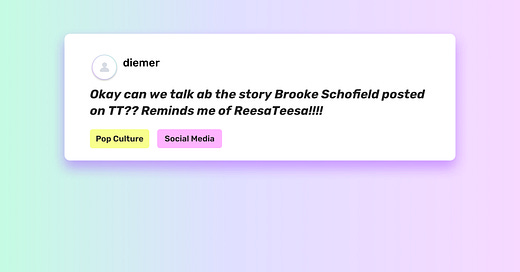Can I blast my ex on social media?
As much as we enjoy consuming this content, it has to be created responsibly.
We’re hiring! Scroll down to read today’s essay, and learn more about our latest internship.
But first, here’s what else people are talking about on Diem:
why do some clitorises look like they were about to develop testicles?
I want to immerse myself in queer culture and content. I need recommendations!
✨Diem got a brand new update!✨ Customize your profile with things like your location and interests, request Spaces, and more. Make sure to update your app on iOS, web, or Android — and start requesting Spaces here!
When I was 17, I found out my boyfriend had been cheating on me. It unearthed a white-hot rage I had never felt before. It was a blinding, disassociating anger that started with a rush of emotions only to be quelled by an eerie, piercing calm: I was going to ruin his life.
That’s all I could think on my drive home from a party, where I had learned about his infraction. I tried calling, and was sent to voicemail (a friend, I’m guessing, had given him a heads up). He wouldn’t talk to me, or even acknowledge what he did, and without any kind of confrontation or closure, there was nowhere for me to put my anger—except social media.
"Just wanted to say thank you for cheating on me and then lying about it,” I posted to his Facebook wall. It was an uncomfortable spectacle, especially back then. Most people scrolled past, pretending they couldn’t see this intimate moment happening in plain sight.
This was around 2010, before we started championing vulnerability on social media. But the feelings behind it—of betrayal and frustration and of needing someone, anyone, to hear your story lest it stays trapped inside you eating you alive—are timeless. We’re currently witnessing it on TikTok.
On February 14, a creator named ReesaTeesa captivated the app with her fifty-part series about an ex who didn’t just screw her over, but lied, forged documents, and committed other infractions that are likely being turned into a movie as we speak. Totalling eight hours, the series captured millions of viewers. Teesa had a knack for storytelling, and a story that needed to be told.
She also inspired a movement. Not long after, creator Brooke Schofield took the baton. She posted her own multi-part TikTok series detailing her relationship with Clinton Kane, a singer she alleges, among other things, lied about the death of his mother. That saga is still ongoing, with Kane firing back—and Brooke holding her own.
This past weekend, a third woman came to social media to spill her guts. Madeline Argy, a member of Alex Cooper’s podcast network and (former?) girlfriend of rapper Central Cee, exposed how she realized their relationship drama was being used as a tool in his music promo, and accused him of cheating on her with Ice Spice.
We’re not used to this kind of honesty—raw, in-the-moment, and with receipts. There are no joint notes app statements here, no vague allusions to “going through a hard time.” These women are not hiding their rage behind the facade of a more acceptable emotion. They are telling us exactly what’s wrong, and who hurt them. It feels like some kind of dam has been breached, and the anger is spilling out and into the feeds of millions of people who this time aren’t scrolling past out of discomfort, but locking in, listening, and validating the feelings.
Women being given the floor to talk candidly and at length about their pain feels like a sea change. Of course, places like Diem have always been safe spaces for women sharing their stories, but mostly with other women. To see more mainstream apps like TikTok also begin embracing the messy, complicated, painful, and ridiculous stories of womanhood gives us the broader freedom to reclaim our narratives, and signals a welcome shift in attitudes towards women’s stories beyond just being “gossip.”
However, this shouldn’t be interpreted as an open invite to blast every ex for every infraction online. As much as we enjoy consuming this content, it has to be created responsibly. Publicly calling out your exes may only create more conflict instead of catharsis, and risks inviting legal action if you ever cross over into defamation. Did I feel better after calling out my ex on Facebook? In the moment, yes, but today I cringe knowing it’s part of my digital footprint.
But there are places online to find an audience for your anger. In fact, we’re begging you: Blast your own ex over on Diem.
ICYMI
Nipple Tingles and Freelipping
Welcome to The Briefing, a roundup of the best of girl internet (AKA Diem) this week. You’re receiving this because you signed up for the Diem App. If you’d like to update your preferences, head here. Forwarded this email? Subscribe now for the best of Diem every Tuesday and Friday.
Before you go…
🎓 ATTN COLLEGE STUDENTS 🎓 We're creating a Diem College Campus Ambassador Program (think: the sorority you've always wanted and never had). If you're a college student, we want your ideas to make our program as fun for you as possible! Head over here to fill out our feedback survey!







